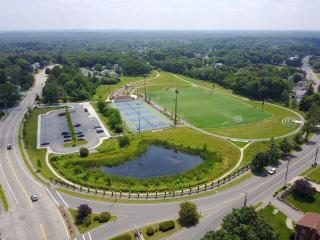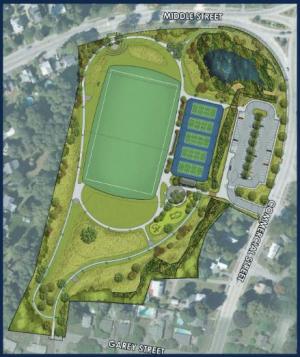Legion Field Restoration

Find construction photos here.
For questions on maintenance or programming, please contact Weymouth Recreation at (781) 682-6124.
Legion Field reopened to the public in the summer of 2015. Improvements to this public space included an artificial turf field, looped walking paths, five tennis courts, and a playground for various age groups. In addition, a new entrance and parking lot were constructed along Commercial Street, with the former parking lot off Garey Street converted to green space.
Legion Field was built in 1925 as a federal public works project. Ernst Hermann, a Newton architect, designed the park, and the local post of the American Legion donated $8,000 to assist the construction. For a better part of a century, Legion Field was home to Weymouth's Wildcats football team. It featured two football fields, two baseball diamonds, two concrete grandstands, seven tennis courts, and a quarter-mile track with jumping pits. Generations of residents remember the field as the epicenter of sports and ceremonies in Weymouth. Its gridiron was the site of countless football games, track events, and high school graduations.
Starting in 2004, Legion Field fell into disuse with the opening of a new high school and athletic fields in South Weymouth. In 2007, Mayor David Madden proposed a $7.3 million plan to reconstruct Legion Field as a major sports complex. After months of public hearings, the Town Council rejected the plan by an 8-3 vote citing concerns from neighbors that a large complex would overwhelm the surrounding single-family homes. Less than a year later, the Town faced an unforeseen $3.4 million budget gap driven by the onset of the Great Recession. Although a comprehensive renovation of the field was preferred, economic conditions necessitated a phased approach (see Project Timeline below).
 In June 2014, the Town Council unanimously authorized borrowing of $6 million for the renovation of Legion Field, which by that time had fallen into disrepair. Improvements to the field were designed by Activitas Inc. of Dedham, with input from neighbors and the community at large. Construction was completed by Fleming Brothers of Quincy between 2014 and 2015.
In June 2014, the Town Council unanimously authorized borrowing of $6 million for the renovation of Legion Field, which by that time had fallen into disrepair. Improvements to the field were designed by Activitas Inc. of Dedham, with input from neighbors and the community at large. Construction was completed by Fleming Brothers of Quincy between 2014 and 2015.
On June 25, 2015, Legion Field reopened to the public. More than 7,000 people joined with Mayor Susan Kay, the Town Council, state and local officials, and New England Patriot's player Malcolm Butler to "welcome back an old friend." The field was ceremoniously rededicated to honor Harry Arlanson, coach of the Weymouth Maroons from 1935 to 1953 who enjoyed eight undefeated seasons while leading the team to six Class A championships. Arlanson's descendants were on hand for the unveiling of a stone, memorializing the field in Arlanson's name. Find photos of the event captured by the Weymouth News here.
Project Timeline
2014
- In March 2014, Activitas presented 75% design plans.
- In June 2014, the Town Council unanimously approved a $6 million borrowing authorization for Legion Field.
- A groundbreaking ceremony was celebrated on June 18, 2014.
2013
- Mayor Kay and the Town Council appropriated $150,000 in Community Preservation funds for the design of Legion Field and Lovell Playground. The Town chose Activitas as Project Designer.
- In December 2013, Activitas presented 25% design plans to the community.
2012
- Legion Field's wrought-iron fence was restored for approximately $107,000 in Community Preservation funds.
- Legion Field's concrete wall was repaired for approximately $148,000 in Community Preservation funds.
2011
- Legion Field's grandstands and sports lighting were removed for approximately $215,000 in Free Cash.
2010
- Legion Field's 66 brick piers were repaired for approximately $213,000 in Community Preservation funds.
2008
- Mayor Susan Kay proposed "safe proofing" Legion Field by tearing down the park's concrete grandstands and restoring the perimeter fence. This plan was dependent on a $750,000 grant approved through the Massachusetts state budget. Due to budget cuts, the final grant amount was $87,500.

